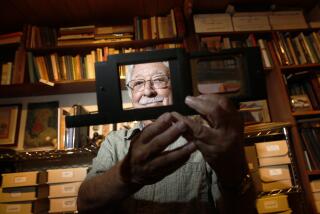Bandit’s Legacy : Vasquez Backed as Name for Agua Dulce School
- Share via
Gang leader Tiburcio Vasquez was never a tagger. He preferred armed occupation and looting of entire towns. At least until he was hanged for murder in San Jose.
On the plus side, he had exceptionally good handwriting and was apparently well-educated.
Still, there was some grumbling that perhaps Vasquez, who died in 1875, might not be the best historic figure to use for naming a proposed new high school in Agua Dulce.
“Some people object to having a high school named after a bandit,” said Joyce Field, board member of the Acton-Agua Dulce Unified School District during a meeting Thursday on the subject.
Those reservations noted, Vasquez was the hands-down winner in a local contest to christen the new high school. The site is just a stone’s throw from the Vasquez Rocks Park, so named because the 745-acre preserve is where Vasquez and his gang would hide out from the law.
The school district’s board members in an informal vote Thursday unanimously agreed to use the name despite Vasquez’s reputation for cattle-rustling, stagecoach-robbing and womanizing.
After all, said board members, he had won the community’s contest fair and square. And furthermore, Vasquez met the requirements set by the district of having historic significance, as well as a name easy to pronounce and relatively short.
“If there is one historical figure that has a connection with this area, it’s Vasquez,” said Don MacAdam, one of the developers who donated the 40-acre high school site. He concurred with the board’s sentiments.
Vasquez High School trounced Magic Johnson High School, John Wayne High School and Cost-A-Lotta High School, three of the other 36 names submitted in the contest.
Besides, historians have not given Vasquez a fair shake, said Cal State Northridge Chicano Studies Professor Rudy Acuna.
“He was a revolutionary, not a bandit,” said Acuna, who likened Vasquez to Robin Hood. “His method was going around robbing gringos. He didn’t rob his own people and had lots of popular support.”
In California at the time--the 1850s and 1860s--many native Mexicans were growing increasingly angry over the immigration of Anglos. Longtime residents were suddenly treated as second-class citizens, according to Vasquez’s own account, which has been preserved in hand-written letters.
“As I grew into manhood I was in the habit of attending balls and parties given by the native Californians, into which the Americans, then beginning to become numerous, would force themselves and shove the native-born men aside, monopolizing the dance and the women,” wrote Vasquez, as accounted in Acuna’s book, “Occupied America.”
“A spirit of hatred and revenge took possession of me,” Vasquez wrote.
In response, he turned to a life of crime, he wrote, waging 20 years of guerrilla warfare that at one point drew sheriff’s deputies on a fruitless 61-day, 2,720-mile chase and earned Vasquez the title “Scourge of California.”
At one point, he and his gang allegedly took over the towns of Tres Pinos and Kingston, tying up citizens and carting off their valuables.
Although he was eventually captured and hanged for murder, school board member Field said she heard there is an out-of-print book that theorized Vasquez was framed.
Hoping to settle the issue, Field pointed out that besides Tiburcio, the rest of the Vasquez family was apparently law-abiding and well-respected.
Just because one member of the family “maybe had been a little bit shaky, doesn’t mean the entire family should be discounted,” Field said.
More to Read
Sign up for Essential California
The most important California stories and recommendations in your inbox every morning.
You may occasionally receive promotional content from the Los Angeles Times.













